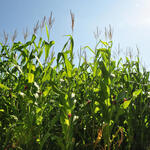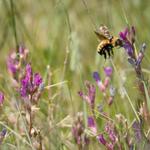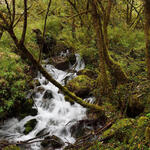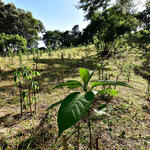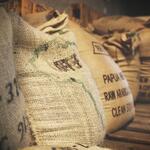- Date: 17 November 2021
Can plastic made from plants solve the plastic pollution crisis? The answer is no, not exactly; but, plant-based plastic (also known as bio-based plastic or bioplastic) will play a role in charting a path towards circularity.
Plastic production and pollution have been growing for decades, with lasting impacts to ecosystems around the world, with no end in sight unless we change course today. Fortunately, we can, by transforming our broken linear systems into circular ones. This will require a multi-faceted approach, including a combination of strategies focused on plastic reduction, reuse, and recycling. One of the key outcomes we'll need to see is the shift away from fossil-based plastic which has been a key feature of the take-make-waste linear economy fueling the environmental crisis today.
Currently, 99% of new plastic is made from fossil fuels, meaning the plastic that we use today starts trashing our planet long before it becomes trash. From the moment they’re made, these conventional plastics are contributing to climate change, degrading habitats, and threatening communities around the world.
But, even the most functional of circular economies will still require some new plastic to meet our most critical needs, like keeping our foods fresh and our medications safe.
The good news is that there is a better path forward. Sustainable inputs – primarily, post-consumer recycled content and responsibly sourced plant-based plastic – will power circular economies. They can supply the material we need, but without relying on fossil fuels to produce new (or virgin) plastic. A strong supply of post-consumer recycled plastic in combination with responsibly sourced plant-based plastic, means we will no longer need to rely on fossil fuels to meet our remaining need for new plastic.
Plastic made from seaweed, sugar beets, or other plants can be an important part of the solution.
However, not all plant-based plastic is good for the environment. In order to serve as a truly sustainable alternative, the material must be thoughtfully designed to build environmental, social, and economic resilience across ecosystems and communities. WWF convenes the Bioplastic Feedstock Alliance, a multi-stakeholder working group formed by some of the world's leading companies to advance knowledge of bioplastics and their potential social and environmental impacts. The BFA has developed a shared sustainability assessment for plant-based plastics to help actors make thoughtful decisions about biobased plastic sourcing, and drive change at scale.
Responsibly sourced plant-based plastic must also look beyond the benefits at the point of sourcing, to consider what will happen to the plant-based plastic after it has been used. Waste management practices, including collection, recycling, and composting, must be in place to ensure that this type of plastic can be effectively recovered and recirculated through the plastic system, and not end up as waste.
WWF continues to lead the charge to help reimagine how we source, design, and reuse the plastic materials communities most depend upon. Plant-based plastics represent an opportunity to reduce the negative impacts associated with the traditional sourcing of plastic from fossil fuels, and perhaps even contribute to the local economies, ecosystems, and resilience of communities in which they're grown. But plant-based or fossil-based, plastic has no place in nature.
For more information, visit the Bioplastic Feedstock Alliance website here or check out WWF's Position on Biobased and Biodegradable Plastic.
- Date: 28 October 2021
- Author: Martha Kauffman, Vice President, WWF’s Northern Great Plains Program
It is impossible to gain a real understanding of a grassland until you’ve spent a great deal of time in one, watching, listening, and returning time and again to observe seasonal changes, or how the rise and fall of moisture influences wildlife and wildflower blooms. The first lesson that we’re often taught is just how deeply complicated these ecosystems are.
- Date: 26 October 2021
- Author: Linda Walker, Senior Director, Corporate Engagement, Forests
Today, HP announced an $80 million expansion of its forest conservation partnership with WWF to help restore, protect, and improve the management of nearly 1 million acres of forest around the world by 2030. With this next step in our decades-long relationship, HP now becomes WWF’s largest U.S. corporate partner.
There is an urgent need for business leaders to set and implement rigorous nature and climate targets and to meet them by investing in high-integrity nature-based solutions that put people and communities at the center. This move from HP raises the bar for what leadership looks like for corporate climate and nature commitments. As part of the company’s sustainability and climate strategy, HP is pledging to address the downstream impacts of its business on nature by taking action for forests at a level that considers all the paper that runs through its printers and print services by 2030, even if it’s not HP branded.
- Date: 26 October 2021
- Author: Anneliese Olson, HP Inc.
Here’s a challenge for you: Reflect on the places where you experienced life’s simplest pleasures. Do you imagine the scenic hike you took to get some steps in for the day? That park you took your kids to every Saturday morning? Or maybe even your own backyard?
It’s impossible for me to imagine being in any of my favorite places without trees, but beyond my personal enjoyment, forests are so important because they are home to three-quarters of the planet’s life on land and provide clean air and water. Forests are simply the best nature-based solution to address the climate crisis, and we must do what we can to protect them.
I’m fortunate to work at a company that understands the true value of forests both to its business and in the fight against climate change and knows the best way to make real impact is through partnership. HP Inc. and World Wildlife Fund (WWF) have been working together for over a decade to ensure that we are sourcing our paper products responsibly. Partnerships like this have helped HP reach many environmental milestones. HP brand paper has been deforestation-free since 2016, and in 2020, HP achieved zero deforestation for 99% of HP paper-based product packaging with the remaining 1% assessed to ensure reported fiber usage meets HP’s Sustainable Paper and Wood Policy.[i]
In 2019, HP and WWF joined forces to go beyond our sourcing and broaden our conservation efforts to help safeguard global forest ecosystems. In the past two years, we’ve been collaborating to restore part of Brazil's threatened Atlantic Forest and increase sustainable management of state-owned forest farms in China—with the aim of protecting a combined area of over 200,000 acres.
Brazil’s Atlantic Forest is a biodiversity hot spot, home to iconic wildlife like the jaguar and 7% of Earth’s plant species. But it has lost more than 83% of its original area. Partnering with landowners and local groups, WWF and HP are helping to restore critical areas of the Atlantic Forest. Since 2019, together we have engaged over 50 local institutions and 150 community stakeholders in the Serra do Mar, Mogi Guaçu, and Upper Paraná regions to secure their participation in forest restoration activities.
In China, WWF and HP are working with forest agencies and forest owners to pursue Forest Stewardship Council® (FSC®) certification under the new FSC-China national standard across 220,000 acres. China is one of the largest producers of paper products, yet it relies heavily on imported wood to meet demand, much of which comes from countries with high risk of deforestation. Improving forest management in China can help reduce pressure on threatened and high value forests. The partnership is providing training and technical support to forest managers of 462,000 acres of forestland to help improve forest management practices and enable the long-term success of FSC certification.
Ahead of the UN Climate Change Conference (COP26) this year, we announced a partnership expansion with WWF to counterbalance the amount of paper, regardless of brand, used in HP printers by conserving an equivalent number of forest resources.[ii] This builds on HP’s support of WWF’s development of science-based targets for forests. HP will be the first company to pilot a new methodology developed by WWF as part of its work on science-based targets for forests to more comprehensively estimate the impact on forests from non-HP paper that runs through HP printers globally. And then HP and WWF will protect, restore, and improve the management of a requisite amount of forests. By doing so, HP is helping to ensure nature-based solutions are informed by the best available science and protect the co-benefits forest ecosystems provide for people, plants and animals. As part of this partnership expansion, WWF is also joining HP’s Sustainable Forest Collaborative, a cross-industry collaboration we launched in 2019 to demonstrate scientific and commercially viable approaches to keep working forest ecosystems healthy.
For over a decade, our work with WWF and partners has helped us drive lasting, positive impact for the business and the planet. We’re proud and excited for the next decade of working alongside WWF to make a forest positive future a reality.
[i] In 2020, 99% of HP brand paper and paper-based product packaging were derived from certified or recycled sources. Packaging is defined as the box that comes with the product and all paper-based materials inside the box.
[ii] Fiber by weight will be 1) certified to rigorous third-party standards, 2) recycled, or 3) balanced by forest restoration, protection, and other initiatives through HP’s Forest Positive Framework. Paper does not include fiber-based substrates for HP industrial presses not listed in HP Media Solutions Locator catalogues.
The views expressed in this post do not necessarily reflect those of WWF.
- Date: 21 October 2021
- Author: Jason Clay, SVP, Markets & Executive Director, WWF Markets Institute
Trade is fundamental to well-functioning economies. It’s also critical for sustainability and for building more resilient food systems that can address the variability of the COVID-19 pandemic in the short term, but also for the chronic and urgent weather shifts from climate change. One might not realize it, but up until recently, food was mainly produced, sold, and consumed locally.
While that’s mainly still the case, since 2000 the amount of food traded grew from 6% to 20-25% in 2019. Trade fills gaps during bad years. And while we’ve clearly seen it can experience disruptions, trade also allows countries to achieve food security even, or especially, when what they do best is not food production. Many countries use food exports as a key part of their economy, like Brazil. China also generates a lot of food globally as does the US, though it’s a much smaller part of the economy.
So how do we monitor and govern food traded across international borders? Short answer, it’s complicated.
- Date: 20 October 2021
- Author: Marcene Mitchell, Senior Vice President, Climate Change, WWF
In just under two weeks, the center of gravity for the climate crisis will be in Glasgow, Scotland at COP 26. The Paris Agreement’s over 190 signatories, along with NGOs, academics, corporations, and journalists will descend upon what was one of the most heavily industrialized cities in Europe, to talk about how to decarbonize the world economy.
One of the lingering questions the world will have is whether the United States is ready to be at the forefront of global leadership on climate. The Build Back Better Act, if Congress can pass it before the COP begins, could demonstrate its commitment, and be the herald that the U.S. is prepared to lead on climate.
- Date: 19 October 2021
The Mobile Basin Heirs' Property Support Initiative will help families in the Mobile Basin of Mississippi protect and keep their forestland. The two-year project was launched in October 2021 by the Center for Heirs' Property Preservation™ and the Mississippi Center for Justice with support from WWF and Kimberly-Clark.
The new initiative provides a combination of legal services, information, and access to financial and forestry resources to help Mississippians resolve land title issues that disproportionately affect Black families and often lead to loss of property, wealth, and forest resources.
We sat down with WWF's Senior Vice President for Forests Kerry Cesareo to discuss the project.

WWF's Senior Vice President for Forests Kerry Cesareo
Tell us why you are supporting this initiative and what you hope it will achieve.
Through the Mobile Basin Heirs’ Property Support Initiative, we hope to raise awareness of the legacy and prevalence of heirs’ property land loss, which deeply affects the environment and human well-being and unjustly impacts Black families in the United States. By focusing on the Mobile Basin, this project aims to help historically underserved Mississippians keep their generational land and preserve one of the most biodiverse wood baskets in the country.
In the coming years, the Southeast is facing an alarming loss of forests — up to 23 million acres by 2060. This is partially driven by unsustainable, rapid development. Only by preventing the exploitation of families and their land can we end forest fragmentation and loss in this country and mitigate the worst effects of climate change.
Forests are a source of health and wealth, but the burdens and benefits of caring for forests have not been shared fairly. We need to do everything we can to address injustice and support people who have helped us all by caring for forestlands for generations.
- Date: 18 October 2021
The Mobile Basin Heirs' Property Support Initiative will help families in the Mobile Basin of Mississippi protect and keep their forestland. The two-year project was launched in October 2021 by the Center for Heirs' Property Preservation™ and the Mississippi Center for Justice with support from WWF and Kimberly-Clark.
The new initiative provides a combination of legal services, information, and access to financial and forestry resources to help Mississippians resolve land title issues that disproportionately affect Black families and often lead to loss of property, wealth, and forest resources.
We sat down with Lisa Morden, vice president of safety, sustainability & occupational health at Kimberly-Clark, to discuss the project.

Lisa Morden, Vice President of Safety, Sustainability & Occupational Health, Kimberly-Clark
Why are you supporting this initiative, and what do you hope it will achieve?
The Center for Heirs’ Property Preservation™ and the Mississippi Center for Justice (MCJ) are leading vital work in communities across the U.S. southeast — including near two of the communities where Kimberly-Clark has operations in Mobile, Alabama, and Corinth, Mississippi. Care underpins everything we do at Kimberly-Clark, and supporting heirs’ property owners is certainly in line with our values in this regard.
In addition, the southern U.S. forests that Kimberly-Clark relies on to make our essential products are being lost to unsustainable development at an increasing rate, and we know that heirs’ property can be particularly vulnerable to that trend. Helping these property owners secure clear title to their ancestral land enables them to protect, care for, and benefit from that land, while also advancing our responsible fiber sourcing and climate goals.
It is truly a privilege to support the Center for Heirs’ Property Preservation™, MCJ, and WWF as they advance this important work, with all of the social and environmental benefits it creates.
- Date: 15 October 2021
The Mobile Basin Heirs' Property Support Initiative will help families in the Mobile Basin of Mississippi protect and keep their forestland. The two-year project was launched in October 2021 by the Center for Heirs' Property Preservation™ and the Mississippi Center for Justice with support from WWF and Kimberly-Clark.
The new initiative provides a combination of legal services, information, and access to financial and forestry resources to help Mississippians resolve land title issues that disproportionately affect Black families and often lead to loss of property, wealth, and forest resources.
We sat down with Mississippi Center for Justice President and CEO Vangela M. Wade to discuss the project.

Vangela M. Wade, President and CEO, Mississippi Center for Justice
Tell us about why you are participating in this initiative and what you hope it will achieve.
MCJ’s purpose in this project is to help dismantle the barriers that historically underserved groups and socially disadvantaged farmers face when attempting to access available resources. African Americans, who represent 38% of Mississippi’s population, are more likely to own heirs’ property. As families splintered during the Great Migration from the 1930s to the 1970s, many family members left Mississippi and have no knowledge of their current interest in family land left behind. According to the Census of Agriculture, Black farmers in Mississippi lost almost 800,000 acres of land from 1950 to 1964. Heirs' property is the legacy of racist policies directed at Black farmers and currently presents a major barrier to those farmers’ ability to access available resources — even those resources provided by programs that exist to explicitly address issues of racial justice and equity.
In addition to providing legal assistance so families can establish ownership of their property, this project reaches out to communities around the state to explain what heirs’ property is and what people can do to protect it. We will help heirs’ property owners keep, protect, and utilize their land for generations to come.
This is our goal — to help make people’s land work for them. By maximizing their land’s value, socially disadvantaged Mississippi families are empowered to create generational wealth.
- Date: 14 October 2021
The Mobile Basin Heirs' Property Support Initiative will help families in the Mobile Basin of Mississippi protect and keep their forestland. The two-year project was launched in October 2021 by the Center for Heirs' Property Preservation™ and the Mississippi Center for Justice with support from WWF and Kimberly-Clark.
The new initiative provides a combination of legal services, information, and access to financial and forestry resources to help Mississippians resolve land title issues that disproportionately affect Black families and often lead to loss of property, wealth, and forest resources.
We sat down with Dr. Jennie L. Stephens, CEO of the Center for Heirs’ Property Preservation™, to discuss the project.
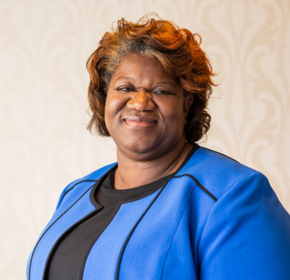
Dr. Jennie L. Stephens, Chief Executive Officer, Center for Heirs’ Property Preservation™
Tell us about why you are participating in this initiative and what you hope it will achieve.
The Center for Heirs' Property Preservation™, has been a 501c3 non-profit organization in South Carolina since 2005. The Center’s mission from day one has been to protect heirs' property and promote the sustainable use of land to provide increased economic benefit to historically underserved families, through legal and forestry education and services.
Property matters to people. It’s far more than just a parcel of land. It can be a window to the past that tells the story of a family, a community, or a way of life. Knowing about your family’s history and culture creates a sense of place and belonging. The loss of heirs’ property has impact on the community, not just one family.
At the heart of the Center’s work is the building of trust in the rural, African American communities where distrust and fear of authority and the legal system is still pervasive. Once trust is established, these communities are open to receiving the education and services that the Center provides. Across that bridge of trust, the Center has seen firsthand how knowledge increases confidence, self-determination, better decision-making, and an ability to take action to positively change a family’s circumstances.
We have been very successful with our mission here in South Carolina, and as part of our long-term strategic plan we have wanted to replicate the model of our organization and take it elsewhere, so other landowners outside of our state can receive the heirs’ property services they often seek from us. We believe that with our proven expertise and with the help of our friends at the Mississippi Center for Justice, and support from partners Kimberly-Clark and World Wildlife Fund, we can achieve similar success in the Mobile Basin.
